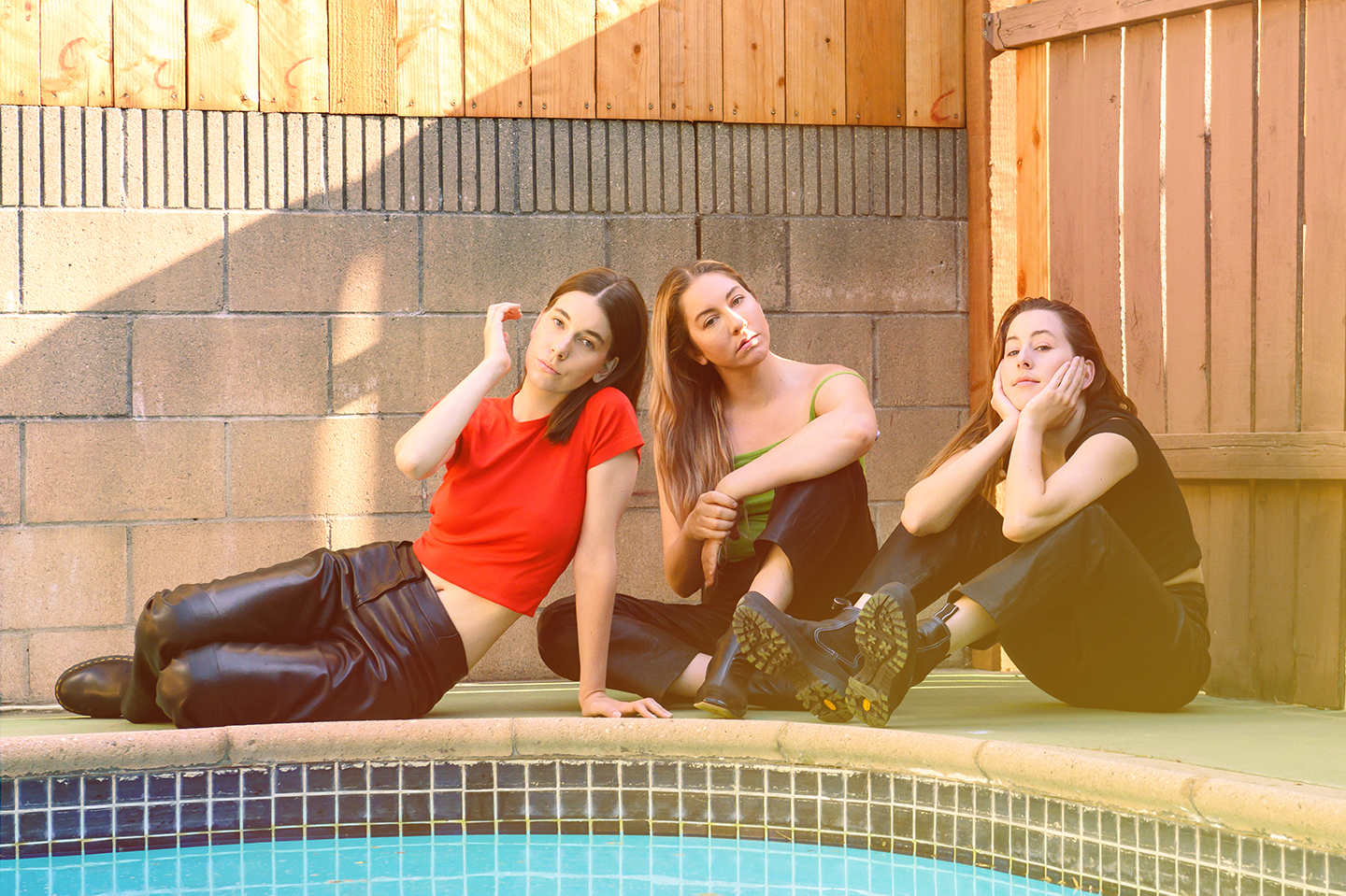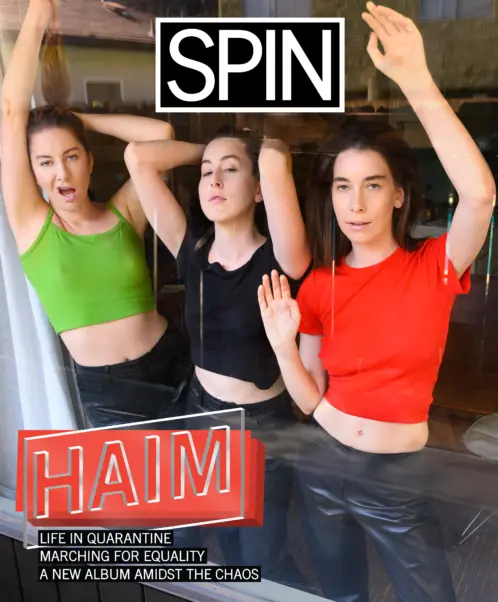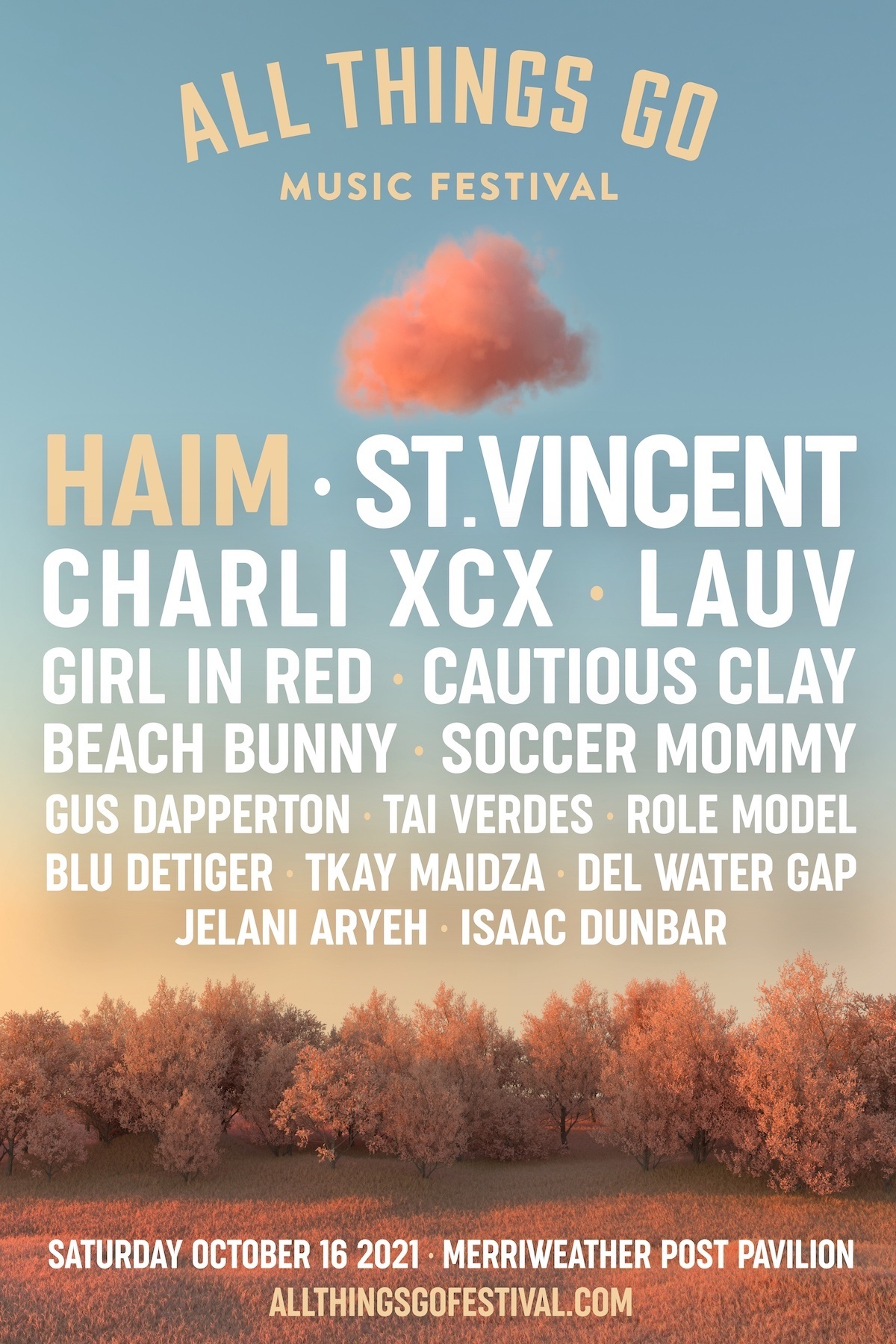The trio, who had their first musical performance as kids at Canter's Deli in Los Angeles’ Fairfax neighborhood, paid homage to their beginnings with a five-city deli tour ahead of their striking, self-aware third album Women in Music Pt. III.
At Sarge's, Este Haim recalled her love for “Ms. Spears” and her 2002 coming-of-age road trip film Crossroads: “I’ve never been the same. I’m forever changed by that movie and that midriff. Now that we’re coming out with a record called Women in Music Part III, I feel like this is the time to play this song, finally.”
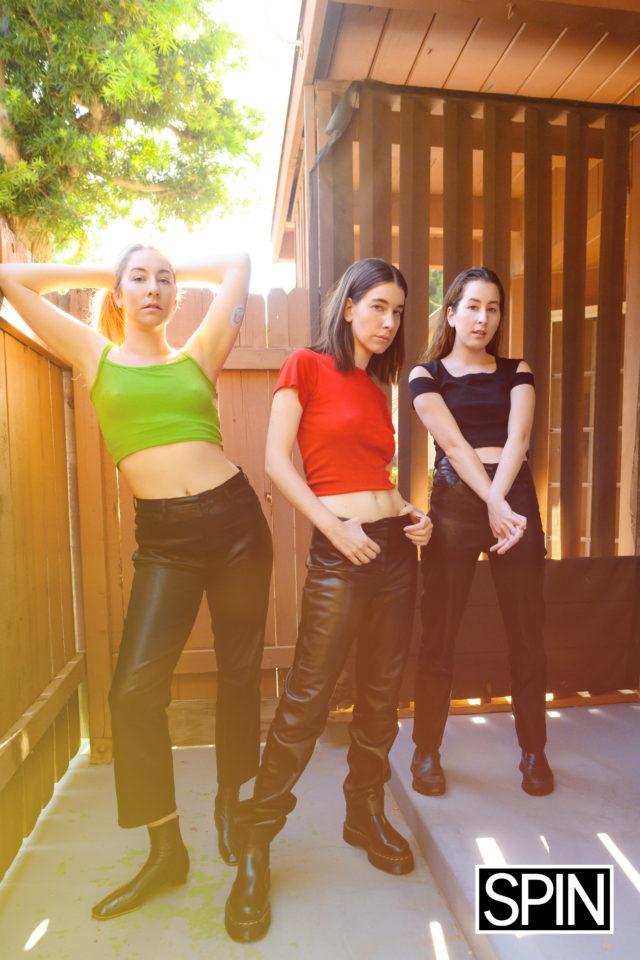
“All of the deli owners that we found were so nice,” Alana Haim says over Zoom months later. “They were like, ‘are you going to bring in a stage? We can only really fit 20 people in here.’ And I was like, ‘That’s great. We just want to set up in your deli and play a show, have it be super intimate and make sure everyone gets, like, a bowl of matzo ball soup, a sandwich, and a black-and-white cookie.’ That's the dream.”
“That was the first time we really had a big-name performer,” Steve Thall, Sarge's executive vice president, explains. “We had a packed house. That day they were here we were sold out.”
Sarge’s is more Carnegie Deli than Carnegie Hall, but according to Thall, the Haims frequented the institution when their parents took them to New York. So, a simple phone call and a well-known pop-rock group turned the restaurant into an unlikely platform for the arts. And at the time, the sisters — and their fans who were squished in leather booths — didn't know that one of their only concerts of the year would be at a pastrami joint in Murray Hill surrounded by signed celebrity photos ranging from Angela Lansbury to Fran Drescher.
It's been more than four months since the pandemic and social distancing began, and since Haim bumped back their album release date and canceled their tour plans. “The thought of not being on tour right now is heartbreaking,” Alana says shortly before the album’s June 26 release date. “We made this record to tour. We always make records so we can tour. We want to be out there playing shows, but when it’s safe.”
Now back in Los Angeles, the three sisters have been quarantining separately — but seeing only each other. “I need to not be around my sisters 24/7,” Alana says. “A lot of siblings will understand why.” Like most of us who have been self-isolating during the pandemic, they miss the human connection. “Can you tell that we haven't had much interaction with people outside each other for a while? We're craving [it],” Este says, as she segues into talking about astrology. “Can we just talk about...where are you? You're an Aries, I'm a Pisces!"
Still, they remain tethered to one another, so much so that during our conversation, Este’s Continuous Glucose Monitoring (CGM) begins setting off alarms for not only Este, but for Alana and Danielle who have apps that alert them when Este’s blood sugar is not in range. “When it's yellow, it means like, ‘Bitch, you're fucking up,’” Este says. “I had a high blood sugar last night.”
Quarantine has been especially challenging for Este. “It's been...really hard,” she says, mimicking the growl of Barenaked Ladies’ singer Steven Page on “One Week.” “I'm in a girl group of diabetics [where we] check in on each other and FaceTime. All of us were collectively like, ‘Oh my God, are we fucked? Like if we get this, are we going to die?’ Every news story was like, if you have an autoimmune disease [that causes] a compromised immune system, which I have, you're at the highest risk of death.”
But no matter what, the Haims are there for one another. The three sisters — Este, 34, Danielle, 31, and Alana, 28 — first began performing in a cover band called Rockinhaim with their mom, Donna, and drummer dad Mordechai. (At the time, Este was 11, Danielle was 8 and Alana was 5.) By 2005, Este and Danielle were in a pop group before leaving to form Haim with Alana, but it didn’t become a professional project for several years. After Danielle helmed her career as a touring guitarist for ex-Rilo Kiley bandleader Jenny Lewis and featured in the Julian Casablancas-led Voidz, Haim became a full-time endeavor in 2012.
In 2013, Haim released their rapturously acclaimed debut album Days Are Gone, a seamless mix of R&B, breezy ‘80s pop melodies and benevolent kiss-offs. Their smooth, pop-rock bagatelles and slick, tri-part harmonies helped usher in a resurgence of yacht rock and a reclaiming of the girl-group identity for an era where women are given credit for their work. They followed it up with their polished, retro sophomore LP Something to Tell You where they doubled-down on their Fleetwood Mac influence and won big with more aggressively catchy choruses. The album received a moderate amount of attention compared to their debut.
Along the way, the band has become beloved for their accompanying visuals, which usually find them energetically strutting through the streets of Los Angeles. In 2017, Haim shared their exhilarating video for “Want You Back,” featuring them dancing, drumming, and twirling down an empty Ventura Blvd. Last year, the sisters returned with the Paul Thomas Anderson-directed video for “Now I’m in It,” which loosely chronicles the chaotic depression Danielle endured: In the video, she floats throughout Echo Park, ends up at a car wash in Silver Lake — sans car — and power-walks with her sisters at night.
Once again, the band enlisted Anderson for the “Walk on the Wild Side”-inspired “Summer Girl,” which follows Haim as they peel off layers of coats, shirts, and sweaters as they saunter through Los Angeles and revisit their first stage at Canter’s. “[Paul] has gotten us over our fear of being in music videos,” Danielle says of working with the Boogie Nights director. “I think he’s brought out our confidence with them.”
Their walking (and dance moves) have become so popular that the internet claimed the trio invented “walk-dancing.” In quarantine, Haim brought their (now) world-famous moves online, setting up dance classes over Zoom. The group promoted them in matching white leotards and black tights; for four Sundays, they taught dance classes to “Want You Back,” “Little of Your Love,” “If I Could Change Your Mind,'' and “I Know Alone.”
Women in Music Pt. III — or its satirical acronym WIMPIII — is Haim’s strongest and most fearless work yet, with a title that takes aim at the gendered, frustrating “girl with guitar” questions that female-identifying musicians often suffer through. While previous records have alluded to the band members’ own experiences of losing control or heartbreak, WIMPIII confronts them head-on. “We've always written from experience on our records, but this is the first record that I'm honestly a little nervous for some people to hear, because it's very specific for certain people in my life, and only they will understand what I'm saying,” Alana says. She’s prepared for the calls she might receive down the line. “When we say it's our most honest, most personal album, it truthfully is,” she adds.

Focusing on sex, heartache, and their West Coast home, Este, Danielle and Alana crafted their most intimate sounding album, experimenting with old pianos and saxophone lines, meanwhile stripping a track bare to just vocals and guitar when they felt like it. Sure, the drum-heavy, radiant melodies Haim fans have come to love are still there, but the band delved deeper into the darkness of their own psyches, leaving them more emotionally raw and vulnerable than ever before on tracks such as “Now I’m in It” and “Man from the Magazine.” Assisting them in the process, Haim enlisted frequent collaborators ex-Vampire Weekend member Rostam Batmanglij and songwriter and producer Ariel Rechtshaid.
But leading up to the making of WIMPIII, Este, Danielle, and Alana found themselves struggling amid personal crises and loss. After years spent on the road, the post-tour hangover caught up with Haim in 2018. “There's this weird thing that happens when you go on tour...where you leave home and it's super exciting, you feel like all of your problems can just stay put, and then you [come back] and open the door and you're like, cute, my problems are still here,” Alana says. The constant cycle of touring and making records caught up with the group; they needed to check in with themselves again.
“With this record, we finally had the time to pump the brakes a second and actually take time to figure out what is happening,” she continues. “We were pushing [our emotions] down so much that it got to the point where it had to come out. It was like shaking a soda pop bottle that was just about to burst.” Alana also found herself reflecting on the death of her best friend when she was 20, something that she reflected on when they released the stripped-back ballad “Hallelujah” last fall. “It was a super emotional experience,” she says. “I remember taking the biggest breath of fresh air and being like, I feel like I just got out eight years of weight that I've just been holding onto.”
At the same time, Danielle had been reeling from the cancer diagnosis her boyfriend, Rechtshaid, had been battling. In fact, for Danielle, Haim’s crisp, jazz-tinged single “Summer Girl,” was about “wanting to be the light when he was feeling really dark about everything.” With WIMPIII, Rechtshaid emphasizes over the phone the importance of Danielle’s storytelling in confronting her emotional scars: “On this record, Danielle just had a burning narrative. She just had things she had to say, where I feel like on the first record, Days Are Gone, [Haim] had something very specific to say, musically, just the way they played together.”
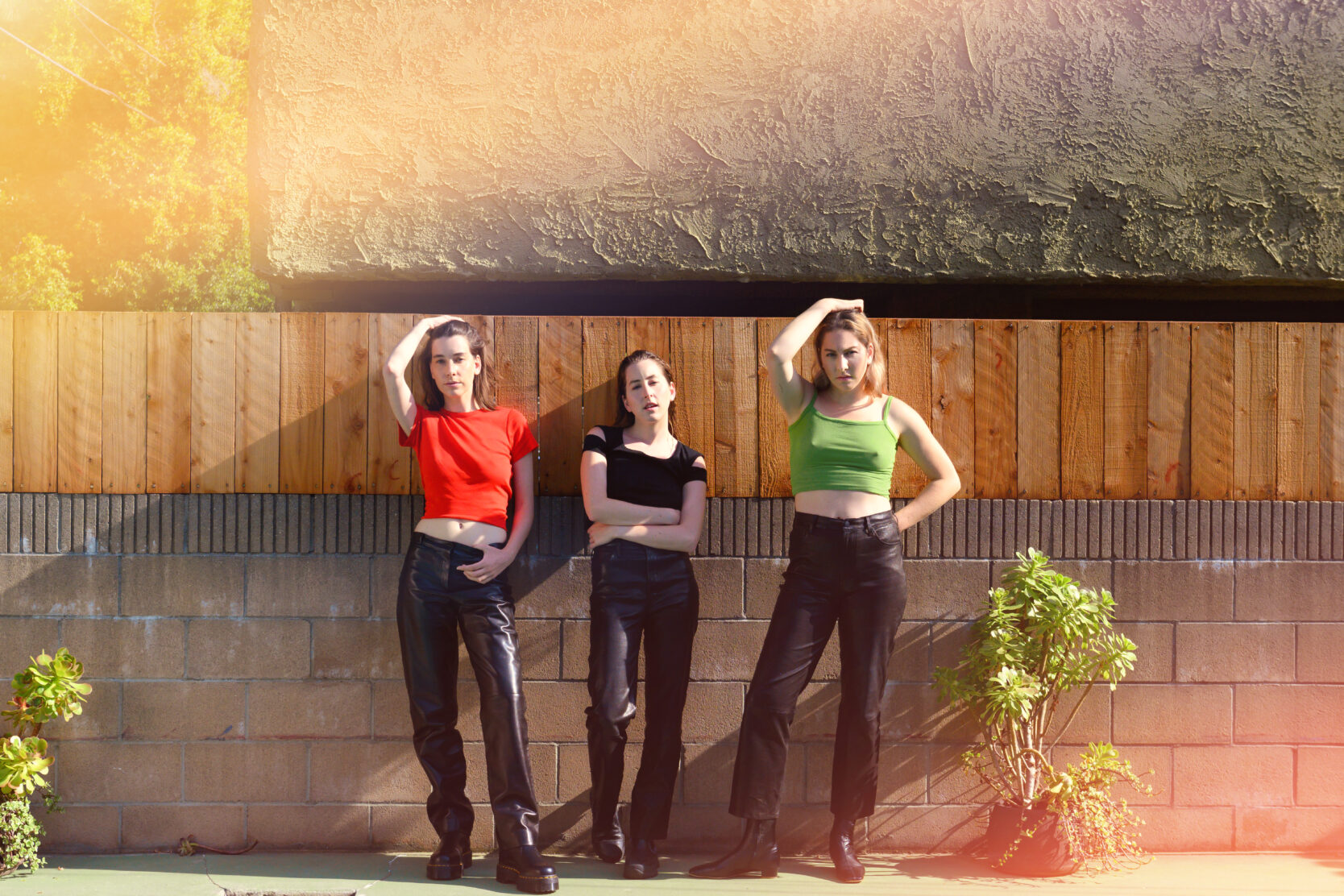
Struggling to write or create, Danielle spiraled into her own depression. “I think after like months of being in this kind of dark place, it just progressively just kind of got worse and worse,” she says. “I felt like it was bad when I was affecting the people around me. I can pull people into my own shit, which is a shitty feeling when you realize that you're doing that, and I didn't even realize that I was really doing it.” Eventually, Danielle ended up seeing a therapist who encouraged her to start writing again. “It felt good to be creative,” she says. Danielle’s personal struggles and calls for help are also reflected throughout the album (“The Steps, “I’ve Been Down, “Leaning on You”). “Asking for help is the hardest thing,” Alana admits.
On WIMPIII, the feeling of isolation Danielle endured was detailed on “I Know Alone,” an experimental dance track that could have been written about the pandemic, but was actually written between December 2018 and January 2019. “It was almost too eerie,” Alana says of the opening line, “Been a couple days since I’ve been out,” which was originally about being on tour. “[During quarantine], it's kind of turned into this, ‘Oh, literally it’s been a couple of days since I've been, not only out of my house, but out of my bed, my room. It took on a really crazy different meaning,” she says. Socially-distanced and six-feet apart on a basketball court, the trio has since shot a no-frills, music video for “I Know Alone” in quarantine, with coordinated outfits and choreography.
Like Danielle and Alana, Este had been struggling in the process of making WIMPIII, confronting health issues from her Type 1 diabetes. The topic is a tough one for the bassist to discuss, especially now. She remembers receiving the difficult news two weeks before the band was supposed to play Coachella ahead of Beyoncé in 2018: that she had stage 3 kidney disease. She found out she needed to start taking medication to stop the degradation of her kidneys and would likely need a kidney transplant in the next few years if they didn’t take a course of action immediately. “I was shell-shocked, but I was also like, wait a minute, I'm supposed to go on tour,” Este says. Still, her doctor advised against it. “I didn't even think about there being an option not to, and it was really scary and really hard, and it's still really scary and hard,” she says while sobbing. As Este takes a breather to grab a glass of water, Alana tries to lighten the mood. “Zoom cries are the weirdest cries that I witnessed during the pandemic,” she says with an awkward laugh.
When Este returns, she unnecessarily apologizes for her tears. “My job is something that brings me so much joy, but the idea of it also being something that is bad for my body and bad for my health is something that I struggle with,” she says. “That's why I feel like it's so hard for me to talk about because I don't want people to think as a Type 1 diabetic that your life is going to be limited because it's not, and I don't want to be a proponent of that idea.” She’s admittedly still “going through a depression about my mortality,” but Este quickly couches her sadness with humor. “Thank God for my SSRIs, and thank God for my therapist,” she says.
The boldest moment on WIMPIII comes on the group’s sparse, drumless “Man from the Magazine,” which takes aim at the inappropriate and misogynistic questions the band has faced from leering journalists, mansplaining and sexism that runs rampant in the music industry. It opens with a question that was once directed verbatim at Este, by a male journalist: “Man from the magazine, what did you say?/’Do you make the same faces in bed?’” One would think that perhaps after having advance access to the song that tactless questions directed towards Haim might be immediately reconsidered. “I wish I could tell you that it’s gotten better,” Este sighs.
Earlier this year, a reporter told the group that he was going to ask them about “what it's like to be women in music,” but realized aloud he shouldn’t because of the album title. “We were like, yes, don't do it,” Danielle recalls. “And don't do it to anyone else, any other women. I feel like people have been sensitive about it, which is cool.” Still, they’ve gotten “lame questions.” A few weeks before our conversation Este recalled speaking to a male rock writer asking who played the funky bassline on “3 AM,” which caused her to be concerned that there was a misprint on the credits. Nope, the writer hadn’t seen the credits but assumed someone else was playing bass on the track. “I was like, 'okay, well just to clarify, tis I on ‘3 AM’, thank you.' And for that matter, I'm playing bass on every fucking song on this record, the last record and the one before that, and I play everything live as well. So to answer your question, it's me. Next question,” Este says.
The band still gets plagued with assumptions that they don’t play their own music. When their NPR Tiny Desk Concert went live in June, there were comments questioning how they were playing together. “You're seeing that I'm playing my guitar. That's me. It's not like it's overdubbed or some shit. With female musicians, it's always been like, ‘this can't be real,’” Danielle says.
The laser-targeted specificity of Haim’s lyrics on WIMPIII has inspired more fan feedback than ever before, particularly the relatable mental health struggles they sing about (which have only been amplified in quarantine). “It feels good to get notes from people that have been listening to the songs and, and hearing their stories and how they've been listening and how they relate to it,” Danielle said. “With the music that we've been releasing, we are getting more of these messages [than ever]. It feels really good to let people know where we're coming from.”
While Los Angeles has been a backdrop for the sisters’ visuals and will always be their home, they’ve had a complicated relationship with it over the years. “There was a point in 2014 where I feel like there was a mass exodus to Los Angeles, and it started to not really look like our city anymore, at least to me,” Danielle says. “But I can't lie. I fucking love L.A., and I will always ride for it.”
Another side of L.A. life is its historically ugly fight for social justice. In keeping with the outspoken nature of WIMPIII, Haim took to the streets in solidarity with the Black Lives Matter movement and against police brutality. “We actually went to [a protest] yesterday,” Alana says. “That was our fourth or fifth. Seeing so many people come together to fight for equality and move as one body in the marches has been really incredible.”
Despite being immunocompromised, Este needed to protest in person. “The only time it ever really kicked in for me was when I got there, when I was like, ‘oh wait a minute, I’m a Type 1 diabetic,’” she says. She couldn’t just stay home: Este felt the need to show her physical support in addition to donations and calling, texting, and emailing representatives. “I didn't even think twice about it, and the good news is, I’m still kicking,” she quips.
Attendees appeared to take the necessary precautions from COVID-19, at least. “Everyone was wearing masks. Every 10 feet or so, people [were] being like, ‘Do you need food? Do you need water? It was so many people helping each other and making sure that no one [was] unsafe,” Alana recalls with pride.
While the sisters have been to many of the Women’s Marches and advocated for gun control, the Los Angeles BLM movement has impacted them even harder. “It didn’t feel right to just stay at home, we needed to be out there with everyone,” Este says. “Walking down Hollywood Blvd. with everyone chanting the same thing, moving together, it was a really special feeling.”
And standing on the sidelines? That’s never been an option — now they're in it.

